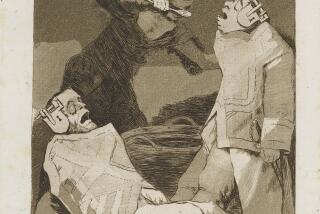Gallery Rogues : FATAL IMPRESSIONS <i> by Wayne Warga (Arbor House/William Morrow: $16.95; 224 pp.; 0-877-95990-0) </i>
On a frigid New York night, a thief breaks into an art gallery on 57th Street to replace an authentic lithograph by Frank Stella with a fake. Within hours, the burglar is murdered.
Soon after, a robber picks the locks of a gallery on Chicago’s posh Michigan Avenue to perform the Stella switch. By morning, his corpse is found afloat in a river nearby.
Next time, the exchange place is a gallery in Venice, Calif., and the criminal’s dead body is discovered by the beach.
So begins “Fatal Impressions,” the sequel to Wayne Warga’s first mystery, “Hardcover,” with all the right ingredients for an alluring tale. In addition to its contemporary art world setting--an arena that gets a lot of press these days--the story has happily married protagonists who fly to Berlin, outsmart a CIA man, collaborate with a slick East German government agent and tangle with a homosexual narcoleptic killer.
All these elements--art, love, foreign espionage and murder--form a premise with promise, and the last quarter of the book pays off with an engaging, fast-moving finale.
However, the first three-quarters of the novel don’t grab the reader, failing either to create compelling, complex characters that we care about or to build suspense.
Jeffrey Dean, a rare-book dealer, and Rachel Sabin, who owns an art gallery, share their passion for one another with a predilection for works by Stella.
When their friend, museum curator Henry Thurmond, is killed--then sexually assaulted--and a Stella lithograph they had loaned him is replaced with a forgery made in Germany, the CIA steps in. The couple are spirited away to Berlin to help find the man behind the murders and the fraudulent prints. Along the way, they befriend a street-smart cop with a master’s degree in fine art.
Warga, a former entertainment editor at The Los Angeles Times and former head writer on the “Entertainment Tonight” TV series, writes with clarity and economy. He knows of where he speaks, even accurately describing Los Angeles’ thriving art scene. Print fraud, an international, multimillion-dollar scam, operates on a much larger scale than sketched here. Experts say chain-store galleries sell volumes of fraudulent prints. But this sort of novel--in which rank amateurs do the work of professionals--always demands, and in this case deftly wins, a suspension of disbelief.
However, accuracy and facile writing don’t make for a captivating story. Warga’s characterizations are flat and dispassionate; who these people are and why they act as they do is poorly explored. Yes, Jeffrey and Rachel hope to find their friend’s murderer, but would they leave home and jobs and risk their lives for the cause? We are not convinced that their friendship was ever that profound. The couple’s sex scenes are gratuitous and reveal more flesh than insight into their relationship.
Most of the book lacks the tension and intrigue of a satisfying mystery as well, partly because of its one-dimensional characters.
Things perk up toward the end however, as the plot quickens, and the threat to human life seems as frighteningly close as the gun to Jeffrey’s groin. Here Warga’s direct style serves him best. Plus, Jeffrey’s character is finally colored-in, creating a greater concern for his fate, that of those around him and the outcome of their dangerous adventure.
A former journalist like Warga, Jeffrey explains how he “became fed up” with the field. “My biggest problem was that I was an observer, and I felt somehow without influence, that I couldn’t change what I was observing. And I finally felt I was even observing my own life, having no impact on it at all. I wanted out and I got out.”
More to Read
The biggest entertainment stories
Get our big stories about Hollywood, film, television, music, arts, culture and more right in your inbox as soon as they publish.
You may occasionally receive promotional content from the Los Angeles Times.










